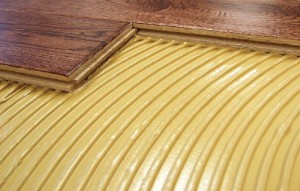Soy Wood Adhesive a First for Franklin
September, 2010
 Thanks in part to funding from the United Soybean Board (USB), Franklin Adhesives & Polymers recently introduced a new bio-modified adhesive. According to the company, this soy-based adhesive for use in manufacturing engineered wood flooring will demonstrate user-friendliness and eco-friendliness at the same time. According to Franklin, soy offers environmental and performance benefits when used in adhesives. Soy represents a renewable feedstock that can replace petrochemical and formaldehyde-containing materials in adhesives. The International Agency for Research on Cancer has classified formaldehyde as a known carcinogen. Soy also offers such performance benefits as greater physical flexibility and longer open time, or more time between the application of an adhesive and when it begins to set.
Thanks in part to funding from the United Soybean Board (USB), Franklin Adhesives & Polymers recently introduced a new bio-modified adhesive. According to the company, this soy-based adhesive for use in manufacturing engineered wood flooring will demonstrate user-friendliness and eco-friendliness at the same time. According to Franklin, soy offers environmental and performance benefits when used in adhesives. Soy represents a renewable feedstock that can replace petrochemical and formaldehyde-containing materials in adhesives. The International Agency for Research on Cancer has classified formaldehyde as a known carcinogen. Soy also offers such performance benefits as greater physical flexibility and longer open time, or more time between the application of an adhesive and when it begins to set.
“Soy provides a natural, renewable alternative to petrochemical-based raw materials,” says Mark Vrana, Ph.D., vice president of technology and quality at Franklin. “Furthermore, it is available in adequate quantities and at an appropriate price point to support large-scale industrial manufacturing processes.”
By extending the open times, Franklin says the adhesive will work well in prepress operations. It can be used in most hot-press operations that have a prepress without special mixing and has performed in a variety of climate conditions. The one-part adhesive requires no mixing, features good tack and includes between 47 and 50 percent solids. It also meets American National Standards Institute and Hardwood Plywood and Veneer Association specifications for water resistance on most wood species. USB provides funding for research and development of soy-based industrial and consumer products. With USB’s help, manufacturers commercialize dozens of new soy-based products every year.
“We’re extremely grateful to USB for their financial support, which provided Franklin with an added incentive to evaluate soy as an adhesive raw material,” Vrana says. “Our goal in the development process was to maintain the performance of a traditional product, while lessening environmental impact through the use of biobased raw materials. Multibond MX-100 meets that goal.”



